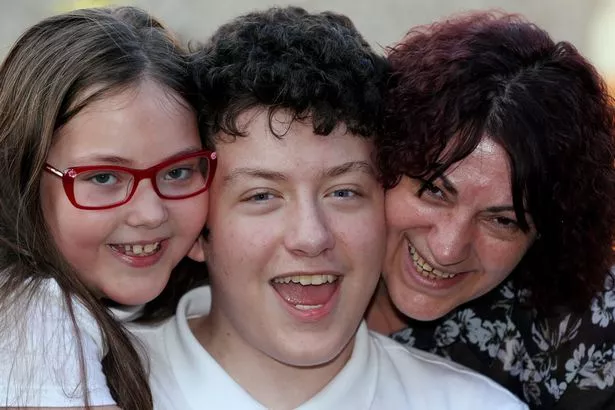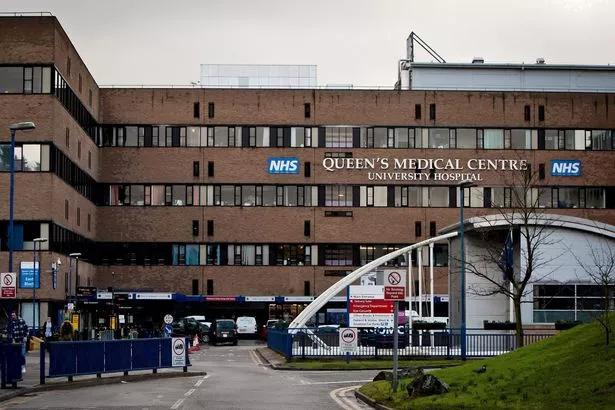AGXStarseed
Well-Known Member
(Not written by me. Although the article is not about Autism, the boy who was 'cured' of his leukaemia has Asperger's and so I felt this article deserved a mention).
James Morley, 11, has improved '100 per cent', now his story could give hope the thousands of young cancer suffers

Miracle: James Morley has improved '100 per cent'
A young boy with leukaemia who was the first in Britain to be given a ground breaking drug on trial has recovered from the disease.
James Morley, 11, has improved "100 per cent" and his story could now give hope the thousands of young cancer suffers across the UK.
The schoolboy was given the awful news in April 2012 after suffering from a series of mystery illnesses .
He started to see red wherever he looked and he visited his optician who found blood cells bursting in his eyes.

Rollercoaster: James, mum Pam and sister Adele have been through the emotional wringer
The youngster was rushed to Kings Mill Hospital in Mansfield, Nottinghamshire, and then to Nottingham's Queen's Medical Centre where he underwent various tests.
A week later doctors diagnosed him with the rare Philadelphia positive type of acute lymphoblastic leukaemia - which only has a 40 to 50 per cent survival rate.
Shortly after his diagnosis, James' family were approached by a consultant about taking part in a research trial for the drug Dasatinib.
Although it was already available for adults on the NHS, James became the first child in the country to trial the drug, which works by blocking a signal that tells leukaemia cells to grow.

Trial: James was treated at the Queens Medical Centre in Nottingham
Dasatinib was believed to be able to help reduce the need for young leukaemia patients to have bone marrow transplants but had never been tested before on kids.
Three years on James, now 14, is in remission and has improved "100 per cent" as a result of the drug according to mum Pam Morley, 48.
She said: "It was a shock at the start.
"It's like a rollercoaster. You don't know when you are getting off or where you are going.
"When we were offered the trial, me and his father sat down and had a think about it.
"James needed to take the first tablet at 5pm that day, so we had to make the decision quickly in order to meet the criteria for the study.
"He's doing absolutely amazing now. Compared to how he was just a year ago, he's improved 100 per cent.
"He has Asperger's syndrome so he understands things quite easily if you make it clear to him, but he was too ill at the time to realise what was going on.
"He's very proud now that he did it, and I am very proud of him too.
"I think at that time you do all you can to save your child, and I think anyone who is offered the chance to take part in a trial should do it.
"There's an 85 per cent chance of relapse without the trial.
"Now children like my son are being given the chance to not only survive, but to live their lives.
"The trials are only with drugs that are the same or better as what you already have access to, so you have nothing to lose.
"We were constantly in hospital with him; it was our second home. We had to keep him in a bubble for the two years of the trial.
"Even the simplest thing like a cold could knock him back and he would be ill for weeks because his immure system was so low.
"It's just so intense because you're walking on eggshells waiting for the next illness to begin.
"But even at the lowest points, James would still sit up and paint. He loves art and he's so talented."
James, who lives with Pam, father Martyn, 52, and nine-year-old sister Adele, has now started at Beech Academy in Mansfield after three years out of education.
Pam, who is training to be a teaching assistant, added: "James is supposed to be in Year 10, but he's had to be put back a year.
"He's physically and emotionally drained from this whole ordeal, but he's come on leaps and bounds.
"At first, he was only allowed to be in school for two hours a day and now he stays there all day.
"People need to be made aware that child cancer exists, and that children die from it.
"More money needs to be dedicated to raising awareness."
James added: "I'm very proud to be part of the trial. If people are offered it, they should definitely go for it.
"All-sorts could come out of it and knowing I can help other poorly children is brilliant.
"It's a bit weird being back in school now, but I enjoy it a lot.
"It's great knowing I have lots of support around me."
James also had to endure up to 20 different forms of gruelling chemotherapy alongside taking the drug, which is now offering hope to thousands of others.
Dr Emma Astwood, paediatric haematology consultant at Nottingham Children's Hospital, said: "Acute lymphoblastic leukaemia is the most common type of leukaemia seen in childhood, but Philadelphia positive only accounts for three to five per cent of childhood cases.
"It means the leukaemia is more difficult to treat than normal and the prognosis for sufferers can be worrying.
"It's difficult to know, but previously the prognosis was about 40 to 50 per cent survival.
"A lot of children have previously needed a bone marrow transplant, which replaces damaged bone marrow with healthy bone marrow stem cells, but transplants are complicated and have significant risks."
SOURCE: http://www.mirror.co.uk/news/uk-news/leukaemia-wonder-drug-cures-british-6576878
James Morley, 11, has improved '100 per cent', now his story could give hope the thousands of young cancer suffers

Miracle: James Morley has improved '100 per cent'
A young boy with leukaemia who was the first in Britain to be given a ground breaking drug on trial has recovered from the disease.
James Morley, 11, has improved "100 per cent" and his story could now give hope the thousands of young cancer suffers across the UK.
The schoolboy was given the awful news in April 2012 after suffering from a series of mystery illnesses .
He started to see red wherever he looked and he visited his optician who found blood cells bursting in his eyes.

Rollercoaster: James, mum Pam and sister Adele have been through the emotional wringer
The youngster was rushed to Kings Mill Hospital in Mansfield, Nottinghamshire, and then to Nottingham's Queen's Medical Centre where he underwent various tests.
A week later doctors diagnosed him with the rare Philadelphia positive type of acute lymphoblastic leukaemia - which only has a 40 to 50 per cent survival rate.
Shortly after his diagnosis, James' family were approached by a consultant about taking part in a research trial for the drug Dasatinib.
Although it was already available for adults on the NHS, James became the first child in the country to trial the drug, which works by blocking a signal that tells leukaemia cells to grow.

Trial: James was treated at the Queens Medical Centre in Nottingham
Dasatinib was believed to be able to help reduce the need for young leukaemia patients to have bone marrow transplants but had never been tested before on kids.
Three years on James, now 14, is in remission and has improved "100 per cent" as a result of the drug according to mum Pam Morley, 48.
She said: "It was a shock at the start.
"It's like a rollercoaster. You don't know when you are getting off or where you are going.
"When we were offered the trial, me and his father sat down and had a think about it.
"James needed to take the first tablet at 5pm that day, so we had to make the decision quickly in order to meet the criteria for the study.
"He's doing absolutely amazing now. Compared to how he was just a year ago, he's improved 100 per cent.
"He has Asperger's syndrome so he understands things quite easily if you make it clear to him, but he was too ill at the time to realise what was going on.
"He's very proud now that he did it, and I am very proud of him too.
"I think at that time you do all you can to save your child, and I think anyone who is offered the chance to take part in a trial should do it.
"There's an 85 per cent chance of relapse without the trial.
"Now children like my son are being given the chance to not only survive, but to live their lives.
"The trials are only with drugs that are the same or better as what you already have access to, so you have nothing to lose.
"We were constantly in hospital with him; it was our second home. We had to keep him in a bubble for the two years of the trial.
"Even the simplest thing like a cold could knock him back and he would be ill for weeks because his immure system was so low.
"It's just so intense because you're walking on eggshells waiting for the next illness to begin.
"But even at the lowest points, James would still sit up and paint. He loves art and he's so talented."
James, who lives with Pam, father Martyn, 52, and nine-year-old sister Adele, has now started at Beech Academy in Mansfield after three years out of education.
Pam, who is training to be a teaching assistant, added: "James is supposed to be in Year 10, but he's had to be put back a year.
"He's physically and emotionally drained from this whole ordeal, but he's come on leaps and bounds.
"At first, he was only allowed to be in school for two hours a day and now he stays there all day.
"People need to be made aware that child cancer exists, and that children die from it.
"More money needs to be dedicated to raising awareness."
James added: "I'm very proud to be part of the trial. If people are offered it, they should definitely go for it.
"All-sorts could come out of it and knowing I can help other poorly children is brilliant.
"It's a bit weird being back in school now, but I enjoy it a lot.
"It's great knowing I have lots of support around me."
James also had to endure up to 20 different forms of gruelling chemotherapy alongside taking the drug, which is now offering hope to thousands of others.
Dr Emma Astwood, paediatric haematology consultant at Nottingham Children's Hospital, said: "Acute lymphoblastic leukaemia is the most common type of leukaemia seen in childhood, but Philadelphia positive only accounts for three to five per cent of childhood cases.
"It means the leukaemia is more difficult to treat than normal and the prognosis for sufferers can be worrying.
"It's difficult to know, but previously the prognosis was about 40 to 50 per cent survival.
"A lot of children have previously needed a bone marrow transplant, which replaces damaged bone marrow with healthy bone marrow stem cells, but transplants are complicated and have significant risks."
SOURCE: http://www.mirror.co.uk/news/uk-news/leukaemia-wonder-drug-cures-british-6576878